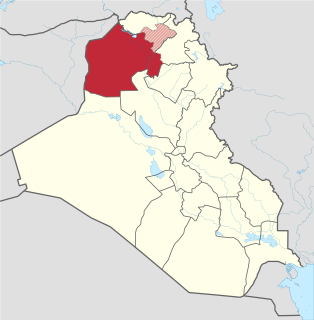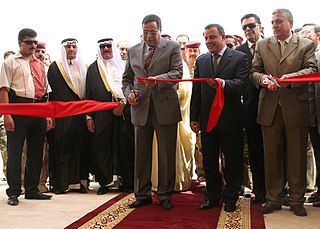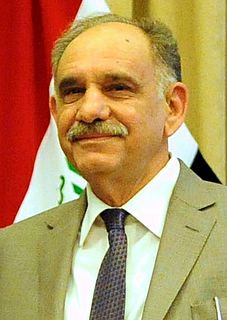
Nineveh Governorate is a governorate in northern Iraq that contains the ancient Assyrian city of Nineveh. It was an integral part of Assyria from the 25th century BC to the 7th century AD. It has an area of 37,323 km2 (14,410 sq mi) and an estimated population of 2,453,000 people in 2003. Its chief city and provincial capital is Mosul, which lies across the Tigris river from the ruins of ancient Nineveh. Tal Afar is the second-biggest city. Before 1976, it was called Mosul Province and included the present-day Dohuk Governorate, which is now part of the autonomous Iraqi Kurdistan.

Ayad Allawi is an Iraqi politician. He served as Vice President of Iraq from 2014 to 2015, interim Prime Minister of Iraq from 2004 to 2005 and was the President of the Governing Council of Iraq in 2003. He became Vice President again, in October 2016.

Following the ratification of the Constitution of Iraq on 15 October 2005, a general election was held on 15 December to elect a permanent 275-member Iraqi Council of Representatives.

Governorate council elections were held in Iraq on 30 January 2005, the same day as the elections for the transitional Iraqi National Assembly. Each province has a 41-member council, except for Baghdad, whose council has 51 members.

Iraq has three vice presidents or deputy presidents, although a debate is ongoing about a political reform to abolish their posts.

Osama Abdul Aziz al-Nujaifi or Najifi is an Iraqi politician and one of the three Vice Presidents of the country. As the Speaker of the Council of Representatives, the informal leader of the moderate Sunni al-Hadba party was the highest ranking Sunni politician of Iraq.

Sheik Ahmed Bezaa Abu Risha is a Sunni leader in the Al-Anbar province, and led the movement of Sunni tribesmen known as the Anbar Salvation Council.

Governorate or provincial elections were held in Iraq on 31 January 2009, to replace the local councils in fourteen of the eighteen governorates of Iraq that were elected in the Iraqi governorate elections of 2005. 14,431 candidates - including 3,912 women - contested 440 seats. The candidates came from over 400 parties - 75% of which were newly formed.

A parliamentary election was held in Iraq on 7 March 2010. The election decided the 325 members of the Council of Representatives of Iraq who would elect the Iraqi prime minister and president. The election resulted in a partial victory for the Iraqi National Movement, led by former Interim Prime Minister Ayad Allawi, which won a total of 91 seats, making it the largest alliance in the Council. The State of Law Coalition, led by incumbent Prime Minister Nouri Al-Maliki, was the second largest grouping with 89 seats.

The al-Hadba party is a political party formed to contest the Iraqi governorate elections, 2009 in Ninawa province. It is mostly made up of Sunni Arabs. Its leading member Atheel al-Nujaifi is brother of Usama al-Najafi who is part of the Iraqi National List led by former Iraqi Prime Minister, Ayad Allawi. It has also been reported that members of the coalition have the backing of Shiite Prime Minister Nouri al-Maliki.
The Al Anbar Governorate election of 2009 was held on 31 January 2009 alongside elections for all other governorates outside Iraqi Kurdistan and Kirkuk.

The Nineveh Governorate election of 2009 was held on 31 January 2009 alongside elections for all other governorates outside Iraqi Kurdistan and Kirkuk.

Qasim Mohammad Abid Hammadi al-Fahadawi is an Iraqi politician and businessman who is the current Minister of Electricity in the Al Abadi Government, and who previously served as the Governor of Anbar from April 2009 to August 2013.

The Iraqi National Movement (INM), more commonly known as the al-Iraqiya List, was an Iraqi political coalition formed to contest the 2010 parliamentary election by Iraqi Vice President Tariq al-Hashimi's Renewal List, the Iraqi National Accord led by former Prime Minister Iyad Allawi and the Iraqi National Dialogue Front led by Saleh al-Mutlaq. The party included both Shi'a leaders and Sunni leaders and claimed to be secular and non-sectarian.
In the aftermath of the 2010 election, great attention was given to the decision on who should be the next Iraqi PM. Both al-Iraqiyya's Allawi and the State of Law coalition's al-Maliki laid claim to the post, so it was seen as up to the Kurdish parties and the Iraqi National Alliance to decide this matter.

The 2013 Nineveh Governorate election in Iraq was held on 20 June with elections for the Al Anbar Governorate. Due to security problems, turnout was less than half that of the 2009 election. This election saw Sunni Arab parties lose a number of seats to minority parties.
Ahmad Khalaf al-Dulaimi is an Iraqi politician and was the Governor of Al Anbar province from August 2013 to December 2014.

Parliamentary elections were held in Iraq on 30 April 2014. The elections decided the 328 members of the Council of Representatives who will in turn elect the Iraqi President and Prime Minister.

The Uniters for Reform Coalition is a Sunni political coalition in Iraq.
The Al-Arabiya Coalition also known as Arabic Coalition is an Iraqi political coalition formed for the Iraqi parliamentary election, 2014 by then-Deputy Prime Minister of Iraq Saleh al-Mutlaq and others parties and independent politicians.

















